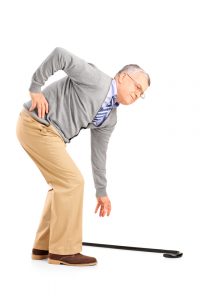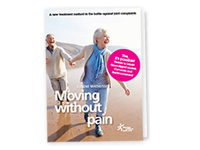What is morning stiffness?
Many people with osteoarthritis, rheumatoid arthritis, fibromyalgia and other rheumatic disorders experience it immediately when getting up. A tight and stiff feeling around the joints and in the muscles. This is called “morning stiffness” or “start stiffness” and can last for half an hour to an hour.
Very annoying, because the usual morning rituals are less smooth. You climb out of bed with the greatest effort, washing is a true martyr walk and dressing takes a lot of time. First, just in an easy chair with a cup of coffee or tea, seems a logical step. But that is not it. Just by staying in motion, the stiffness disappears faster from your limbs.
Osteoarthritis and morning stiffness
Morning stiffness is due to fluid accumulation in the joints. The (low grade) inflammation in the joints ensures that more joint fluid than usual is allowed from the blood vessels to the joints. This is then retained because there are more proteins in the joint cavity than usual, and thus the fluid exchange is out of balance.
If you are in motion, the pump mechanism of the joints causes the fluid to drain sufficiently. But when you sleep, this pump function will operate at a lower speed. Therefore, your joints contain more fluid in the morning. That results in a stiff feeling when getting up. But once you move again, the pump function of the joints will turn on full speed. The excess fluid is then discharged from the joints. This will take up to half an hour.
Rheumatoid arthritis and morning stiffness
In rheumatoid arthritis, morning stiffness may last for at least one hour. This problem is caused by the long period of inactivity during the night on the one hand. In addition, more inflammatory cells are created at night that stimulate the inflammatory hearths. This causes the mucous membranes to swell and this causes that stiff feeling in the morning.
Fibromyalgia and morning stiffness
Morning stiffness is also common in patients with fibromyalgia or muscle rheumatism. Often this is felt throughout the body. This stiffness is caused by the fact that the muscles have not been able to relax sufficiently at night.
Seven tips against morning stiffness
Tip 1: Start up your body in bed
In the morning, calmly start your body. It is therefore wise to start moving slowly yourself. That can be just when you wake up in bed. Very relaxed do some exercises while lying comfortably on your back.
Exercise 1:
Pull up a leg and stretch again. You can hold the leg a few centimeters above the mattress while stretching. Then you train the abdominal muscles at the same time. Perform this exercise ten times with your left leg and ten times with your right leg.
Exercise 2:
Pull a knee towards you as close as possible. Wrap your hands around the knees and hold this position ten seconds. Perform this exercise five times with the left knee and five times with the right knee.
Exercise 3:
Pull up both your knees. Move them to the right and then to the left. Perform this exercise five times.
Exercise 4:
Sit straight up in bed. Bend five times forward, left and right.
Tip 2: Loosen your body under the shower
Take a warm shower immediately after the exercises in bed to warm the body. This improves blood flow and relaxes the muscles. Move all your joints one by one to loosen them. Bend through the knees, swing the arms from front to back, make turns with the wrists and ankles and shake the shoulders.
Tip 3: Take more movement during the day
Try to move moderately intense for five days a week, such as hiking, cycling and swimming. This helps to strengthen the muscles. Having strong muscles relieves the pressure on the joints where the morning stiffness is present.
Tip 4: Ban the cold out of your bedroom
When you sleep, your body temperature will slightly decrease. This also cools down your muscles and joints. As a result, they feel stiff in the morning. Therefore, make sure the temperature in your bedroom (16 to 18 degrees) is pleasant. Wear flannel pajamas and possibly put on an electric blanket. And wear (bed) socks if you suffer from cold feet.
Tip 5: ensure a good night’s rest
During your sleep, your body will recover from the efforts of the day before. So try to sleep at least 8 hours in a row. Do not take your daily worries to bed. That only keeps you from sleeping. The muscles will not get enough rest, which will make them feel stiffer in the morning.
Tip 6: Change positions in bed regularly
Sleeping in one and the same posture is bad news for the joints. As a result, morning stiffness will only increase. Therefore, turn around when you wake up at night. Then pull or stretch your legs and move your arms to another position.
Tip 7: try to prevent inflammations in the joints
By choosing healthy food or using a supplement with, for example, liquid Green-lipped mussel and Bio-Curcumin, you can try to inhibit the inflammations in the joints. This will ultimately also cause you to be less stiff in the morning after waking up: there are fewer inflammations, and no fluid accumulation will occur during resting.
In general, however, the stiffness is still present when NSAIDs are used – although NSAIDs are usually highly effective in achieving pain, this is not the case with morning stiffness. This is due to the side effects of NSAIDs on mucous membranes.

Share this page
Tweet

Download for free the booklet ‘Moving without pain’ with a retail value of $6.75 / £4.95.
Any questions? Please feel free to contact us. Contact us.






